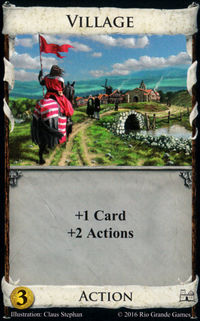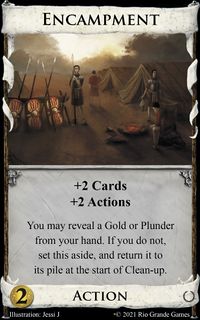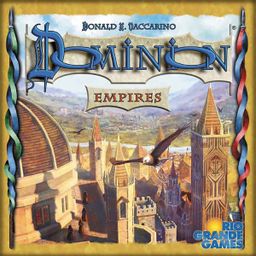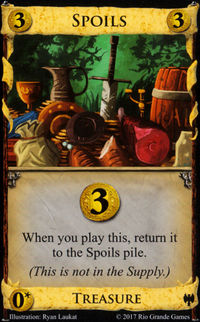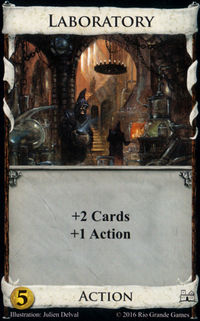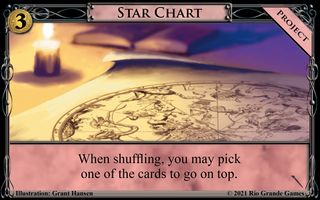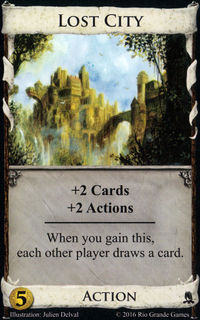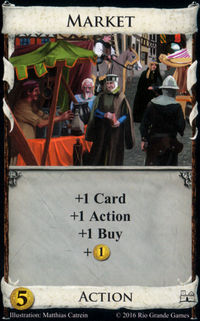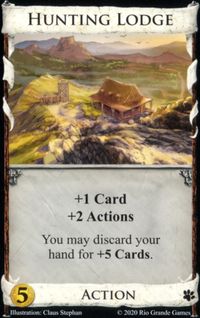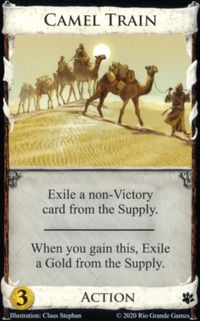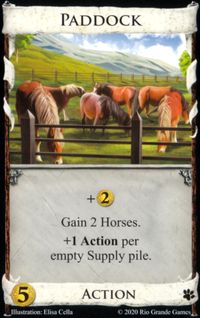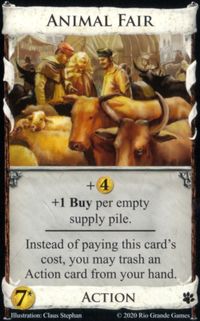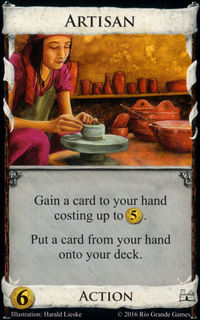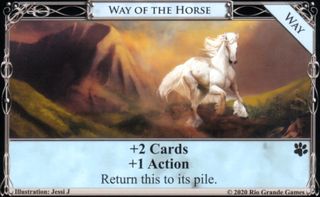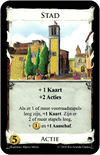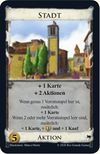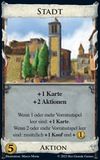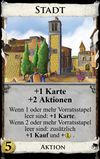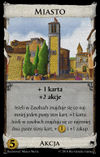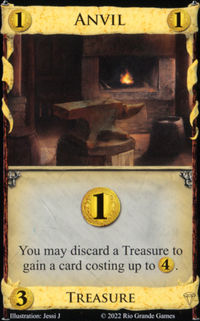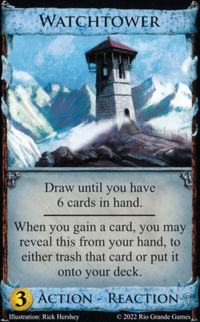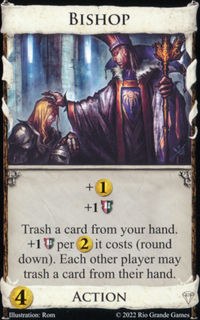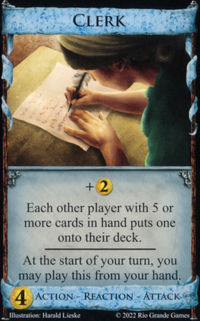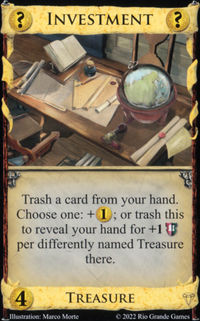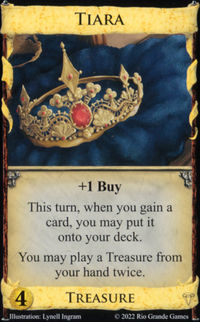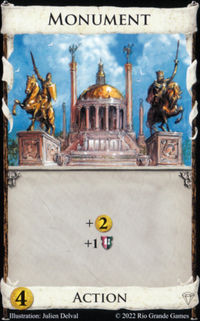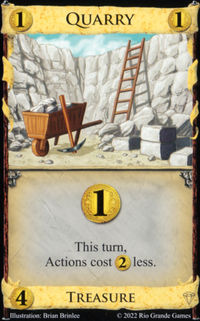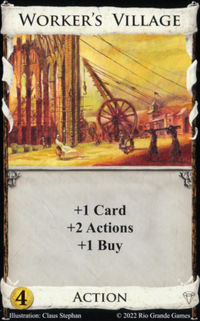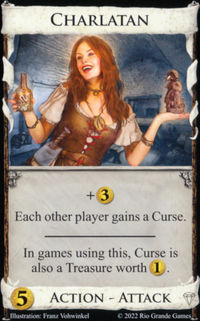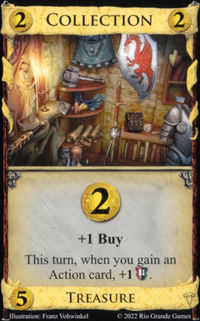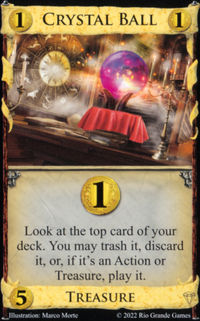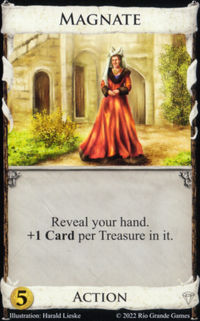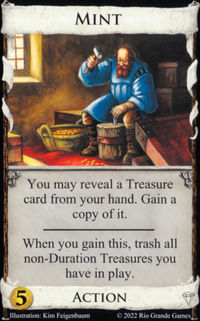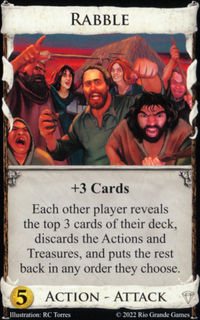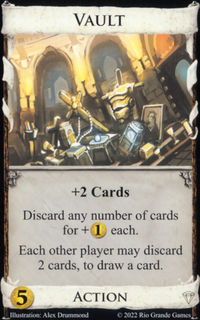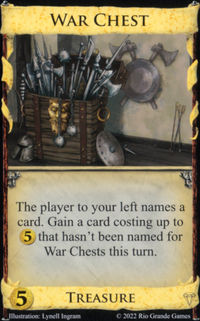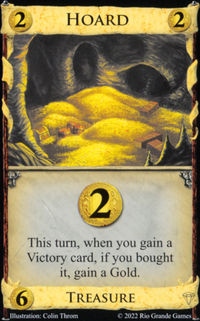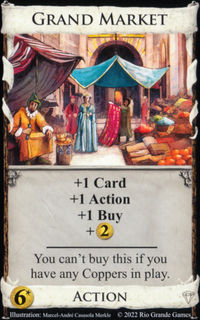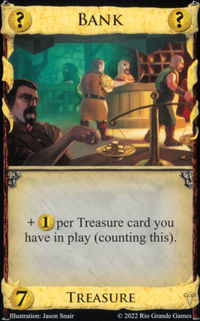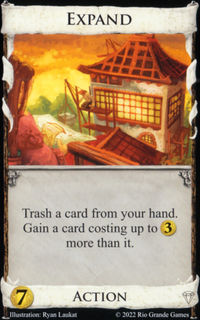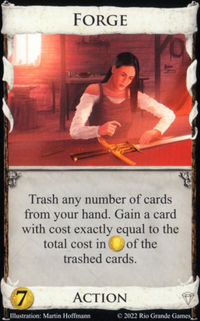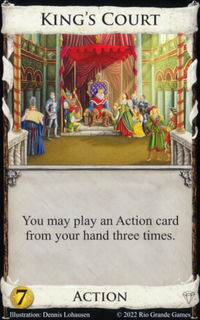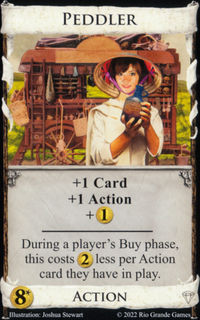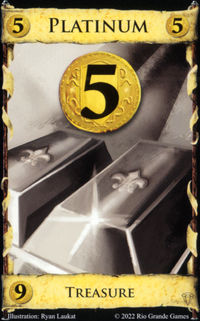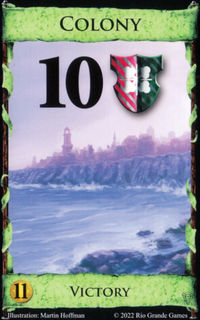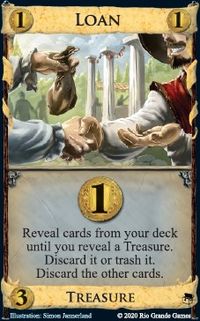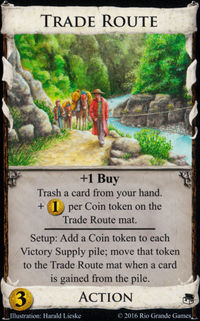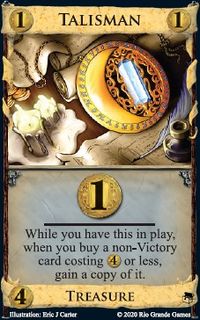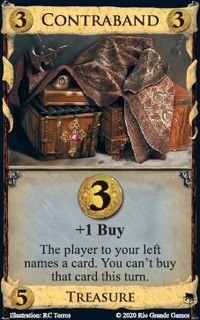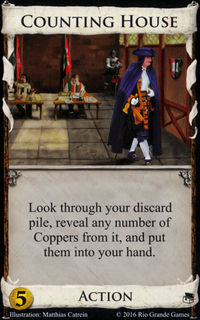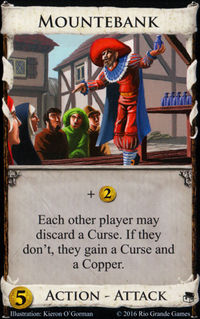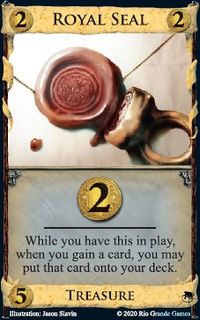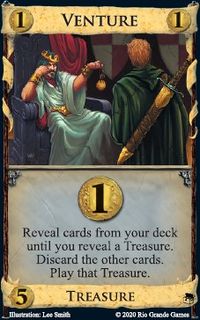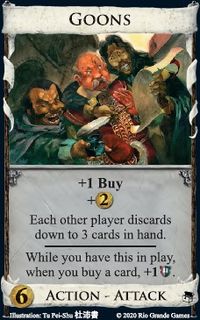City: Difference between revisions
m Robot: Automated text replacement (-from The Other Secret History of +The Other Secret History of) |
|||
| (75 intermediate revisions by 22 users not shown) | |||
| Line 1: | Line 1: | ||
{{ | {{Infobox Card | ||
| | |name = City | ||
| | |cost = 5 | ||
| | |type1 = Action | ||
|illustrator = Marco Morte | |||
| | |text = '''+1 Card<br/>+2 Actions'''<br/>If there are one or more empty Supply piles, '''+1 Card'''. If there are two or more, '''+1 Buy''' and +{{Cost|1}}. | ||
| | |||
}} | }} | ||
'''City''' is an [[Action]] card from [[Prosperity]]. It begins as a simple {{Card|Village}}, but grows stronger as [[Supply]] piles are depleted. | |||
== FAQ == | == FAQ == | ||
=== Official FAQ === | === Official FAQ (2022) === | ||
* You draw a card and get +2 Actions no matter what. | |||
=== Other | * If there is just one empty pile in the Supply, you also draw another card. | ||
* If there are two or more empty piles, you both draw another card, and get +{{Cost|1}} and +1 Buy. | |||
* There are no further bonuses if three or more piles are empty. | |||
* This only checks how many piles are empty when you play it; what you got does not change if a pile becomes empty (or non-empty, such as due to {{Card|Encampment}} from {{Set|Empires}}). | |||
* This only counts Supply piles, not non-Supply piles like {{Card|Spoils}} from {{Set|Dark Ages}}. | |||
=== Other rules clarifications === | |||
* Unlike {{Card|Laboratory}}, if you play this when a pile is empty, you draw a card, then draw a second card separately. So if you only have 1 card in your deck, you can see that card before shuffling and topdecking a card with {{Project|Star Chart}}. | |||
== Strategy == | |||
City starts out each game as an expensive version of {{Card|Village}}, but it becomes a powerful [[draw]] card (equivalent to {{Card|Lost City}} with no on-gain penalty) once a single pile is empty. In the end game, with two piles empty, it adds a {{Card|Market}} effect to this already strong suite of bonuses, which is very often enough [[payload]] to facilitate an immediate [[three-pile ending|pile-out]] even if a third pile wasn’t already threatened. | |||
City is | Because it’s expensive for its unactivated effect, City is unlikely to be an attractive card early in the game unless it’s the only [[Village (card category)|village]] present. It’s usually preferable to meet your initial needs for [[terminal space]] using cards that are cheaper (such as {{Card|Village}} itself) or provide an immediate bonus at {{Cost|5}} (such as {{Card|Hunting Lodge}}). If the [[Kingdom]] offers strong draw options other than activated City or there’s no particular source of pile pressure, City can remain no more useful than an expensive {{Card|Village}} throughout most of the game. However, if you anticipate a pile emptying quickly, e.g. because there’s a strong [[Curser]] or a powerful cheap card alongside abundant extra gains, it may be worth gaining some Cities, particularly if you can make good use of the extra terminal space anyway, or if you can trade off the ability to play them immediately against the cost of obtaining them (e.g. with {{Card|Camel Train}}). In any of these cases, especially if the draw is otherwise weak, City becomes increasingly attractive as at least one pile is lowered, and denying some copies to your opponents can also be a consideration. Increasing the number of players also tends to increase pile pressure, making City potentially more appealing from the beginning in multiplayer games. | ||
If you have multiple Cities in your deck, its draw capabilities may increase explosively once a pile is emptied; therefore, there’s often a strong advantage to being the first to play a turn with activated Cities. In a similar way to {{Card|Paddock}} and {{Card|Animal Fair}}, City can thus create a situation in which all players are reluctant to take the last or penultimate card in a pile (sometimes City itself), as this would risk granting that opportunity to an opponent. The best approach, where possible, is often to use a [[gainer]] to take the last card from a pile early in your Action phase (e.g. playing {{Card|Artisan}} to gain the only remaining City) and then draw with your newly-activated Cities, producing a powerful turn that is likely to put you ahead, especially if this manoeuvre has also enabled you to win the City split and/or to engage in [[gain-and-play]]. If you might be able to empty a Supply pile during your turn, it can be a good idea to hold off playing as many Cities as you can until then, so that you can play them once they give additional bonuses. | |||
The next level of City activation explosively adds payload, including plenty of [[+Buy]] to facilitate spending it, to a deck that already has abundant draw, and without the addition of any [[stop card]]s. Because it occurs when two piles are empty, it’s often enough to allow you to buy out the {{Card|Estate|Estates}} for a three-pile ending, so it’s usually dangerous to allow an opponent to play the first turn with doubly-activated Cities unless you have a significant {{VP}} lead; this is often the last turn of the game. Occasionally, if no piles are empty yet but two are low, it may be possible to skip straight to double activation by emptying two piles at once via [[gainer]]s before playing some Cities during your Action phase; this is likely to put you in a dominant position unless you have very few of the Cities. | |||
In games with abilities to return cards to piles, such as {{way|Way of the Horse}}, it may be possible to deactivate City's bonuses. This may be something you need to avoid, so that your Cities retain their bonuses throughout your turn, or because you have many more Cities than your opponent. But it may also be something you can use to your benefit, by deactivating the bonuses after you've played all of your Cities, causing your opponent's Cities to lack the bonus at the start of their turn. | |||
===External strategy articles=== | |||
''Note: Article(s) below are by individual authors and may not represent the community's current views on cards, but may provide more in-depth information or give historical perspective. Caveat emptor.'' | |||
* [http://dominionstrategy.com/2010/12/09/prosperity-city/ theory's 2010 article] | |||
== Versions == | |||
===English versions=== | |||
{| class="wikitable" style="text-align:center;" | |||
! Print !! Digital !! Text !! Release !! Date | |||
|- | |||
| {{CardLangVersionImage|o=1}} || {{CardLangVersionImage|d=1|o=1||City from Goko/Making Fun}} || '''+1 Card<br>+2 Actions'''<br>If there are one or more empty Supply piles, +1 Card. If there are two or more, {{nowrap|+{{Cost|1}}}} and {{nowrap|+1 Buy.}} || Prosperity || October 2010 | |||
|- | |||
| {{CardLangVersionImage}} || {{CardLangVersionImage|d=1}} || '''+1 Card<br>+2 Actions'''<br>If there are one or more empty Supply piles, '''+1 Card'''. If there are two or more, {{nowrap|'''+1 Buy'''}} and {{nowrap|+{{Cost|1}}.}} || <p>Prosperity [[Second Edition#Formatting_changes|(2016 printing)]]</p><hr><p>Prosperity (Second Edition)</p> || February 2017 | |||
|} | |||
===Other language versions=== | |||
{| class="wikitable mw-collapsible autocollapse" style="text-align:center;" | |||
! Language !! Name !! Print !! Digital !! Text !! Notes | |||
|- | |||
!Chinese | |||
| 都市 || || || style="padding:15px 0px;"| '''+1 卡片'''<br>'''+2 行動'''<br>如果有一個或以上的供應區牌堆是空的:{{nowrap|'''+1 卡片'''。}}<br>如果有兩疊以上的話:'''+1 購買''' 和 {{nowrap|+1 {{Cost|1}}。}}|| | |||
|- | |||
!Czech | |||
| Město || || || || | |||
|- | |||
!rowspan=2|Dutch | |||
| Stad || {{CardLangVersionImage|Dutch}} || || '''+1 Kaart<br>+2 Acties'''<br>Als er 1 of meer voorraadstapels leeg zijn, '''+1 Kaart'''. Zijn er 2 of meer stapels leeg, +{{Cost|1}} en '''+1 Aanschaf'''. || | |||
|- | |||
| Stad || {{CardLangVersionImage|DutchCity2022}} || {{CardLangVersionImage|Dutch|d=s}} || '''+1 Kaart<br>+2 Acties'''<br>Zijn er 1 of meer lege voorraad-<br>stapels, dan '''+1 Kaart'''.<br>Zijn er 2 of meer, dan<br>'''+1 Aanschaf''' en +{{Cost|1}}. || 2. Edition<br>(2022) | |||
|- | |||
!Finnish | |||
| Kaupunki || || || || | |||
|- | |||
!French | |||
| Ville || || || || | |||
|- | |||
!rowspan=2|German | |||
| Stadt ||{{CardVersionImage|City_German-ASS|German language City 2016 ASS}}|| || '''+1 Karte<br>+2 Aktionen'''<br>Wenn genau 1 Vorratsstapel leer ist, zusätzlich:<br>'''+1 Karte'''<br>Wenn 2 oder mehr Vorratsstapel leer sind, zusätzlich:<br>'''+1 Karte''', +{{Cost|1}} und '''+1 Kauf''' || (2016) | |||
|- | |||
| Stadt || {{CardLangVersionImage|German}} ||{{CardVersionImage|CityGerman2022Digital|German language City 2022 from Shuffle iT}}|| '''+1 Karte<br>+2 Aktionen'''<br>Wenn 1 oder mehr Vorratsstapel leer sind: '''+1 Karte'''.<br>Wenn 2 oder mehr Vorratsstapel leer sind: zusätz­lich '''+1 Kauf''' und {{nowrap|+{{Cost|1}}.}} || 2. Edition<br>(2022) | |||
|- | |||
!Italian | |||
| Città || || || || | |||
|- | |||
!Japanese | |||
| 都市 (pron. ''toshi'') || || || style="padding:15px 0px;"| '''+1 カードを引く'''<br>'''+2 アクション'''<br>サプライに空の山がある場合、追加で'''+1 カードを引く'''。<br>2山以上ある場合、さらに追加で'''+1 購入'''、 {{nowrap|+{{Cost|1}}。}} || | |||
|- | |||
!rowspan=2|Polish | |||
| Miasto || {{CardLangVersionImage|PolishOld}} || || '''+1 karta<br>+2 akcje'''<br>Jeżeli w Zasobach znajduje się co najmniej jeden pusty stos kart, +1 karta.<br>Jeżeli w zasobach znajdują się co najmniej dwa puste stosy kart, {{nowrap|+{{Cost|1}} i}} +1 zakup. || (2016) | |||
|- | |||
| Miasto || {{CardLangVersionImage|Polish}} || || '''+1 karta<br>+2 akcje'''<br>Jeżeli w Zasobach jest co najmniej jeden pusty stos kart, '''+1 karta'''.<br>Jeżeli w Zasobach są co najmniej dwa puste stosy kart, {{nowrap|'''+1 zakup''' i +{{Cost|1}}}}. || II Edycja<br>(2022) | |||
|- | |||
!Russian | |||
| Город (pron. ''gorod'') || || || || | |||
|- | |||
!Spanish | |||
| Ciudad || || || || | |||
|} | |||
== Trivia == | == Trivia == | ||
[[Image:CityArt.jpg|thumb|right|354px|Official card art.]] | |||
This was originally called '''Boomtown''', but it was decided that word didn't fit the medieval theme of Dominion, and it was changed. | |||
=== Card Art === | === Card Art === | ||
{{Quote | {{Quote | ||
|Text=This art was also used for the box for Carcassonne: The City. | |Text=This art was also used for the box for Carcassonne: The City. | ||
|Name=[[Donald X. Vaccarino]] | |Name=[[Donald X. Vaccarino]] | ||
|Source=[http://forum.dominionstrategy.com/index.php?topic=5130.msg128558#msg128558 | |Source=[http://forum.dominionstrategy.com/index.php?topic=5130.msg128558#msg128558 'Art Trivia'] | ||
}} | }} | ||
=== Secret History === | === Secret History === | ||
| Line 55: | Line 105: | ||
}} | }} | ||
{{Navbox Prosperity}} | |||
{{Navbox Cards}} | {{Navbox Cards}} | ||
[[category:non-terminals]] | |||
[[category:villages]] | |||
[[category:variable draw]] | |||
[[category:variable coin]] | |||
[[category:virtual coin]] | |||
[[category:extra buys]] | |||
Latest revision as of 08:57, 26 June 2024
| City | |
|---|---|
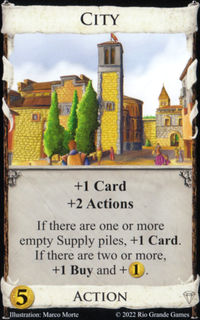 | |
| Info | |
| Cost | |
| Type(s) | Action |
| Kingdom card? | Yes |
| Set |
Prosperity |
| Illustrator(s) | Marco Morte |
| Card text | |
|
+1 Card +2 Actions If there are one or more empty Supply piles, +1 Card. If there are two or more, +1 Buy and +. | |
City is an Action card from Prosperity. It begins as a simple Village, but grows stronger as Supply piles are depleted.
FAQ
Official FAQ (2022)
- You draw a card and get +2 Actions no matter what.
- If there is just one empty pile in the Supply, you also draw another card.
- If there are two or more empty piles, you both draw another card, and get + and +1 Buy.
- There are no further bonuses if three or more piles are empty.
- This only checks how many piles are empty when you play it; what you got does not change if a pile becomes empty (or non-empty, such as due to Encampment from Empires).
- This only counts Supply piles, not non-Supply piles like Spoils from Dark Ages.
Other rules clarifications
- Unlike Laboratory, if you play this when a pile is empty, you draw a card, then draw a second card separately. So if you only have 1 card in your deck, you can see that card before shuffling and topdecking a card with Star Chart.
Strategy
City starts out each game as an expensive version of Village, but it becomes a powerful draw card (equivalent to Lost City with no on-gain penalty) once a single pile is empty. In the end game, with two piles empty, it adds a Market effect to this already strong suite of bonuses, which is very often enough payload to facilitate an immediate pile-out even if a third pile wasn’t already threatened.
Because it’s expensive for its unactivated effect, City is unlikely to be an attractive card early in the game unless it’s the only village present. It’s usually preferable to meet your initial needs for terminal space using cards that are cheaper (such as Village itself) or provide an immediate bonus at (such as Hunting Lodge). If the Kingdom offers strong draw options other than activated City or there’s no particular source of pile pressure, City can remain no more useful than an expensive Village throughout most of the game. However, if you anticipate a pile emptying quickly, e.g. because there’s a strong Curser or a powerful cheap card alongside abundant extra gains, it may be worth gaining some Cities, particularly if you can make good use of the extra terminal space anyway, or if you can trade off the ability to play them immediately against the cost of obtaining them (e.g. with Camel Train). In any of these cases, especially if the draw is otherwise weak, City becomes increasingly attractive as at least one pile is lowered, and denying some copies to your opponents can also be a consideration. Increasing the number of players also tends to increase pile pressure, making City potentially more appealing from the beginning in multiplayer games.
If you have multiple Cities in your deck, its draw capabilities may increase explosively once a pile is emptied; therefore, there’s often a strong advantage to being the first to play a turn with activated Cities. In a similar way to Paddock and Animal Fair, City can thus create a situation in which all players are reluctant to take the last or penultimate card in a pile (sometimes City itself), as this would risk granting that opportunity to an opponent. The best approach, where possible, is often to use a gainer to take the last card from a pile early in your Action phase (e.g. playing Artisan to gain the only remaining City) and then draw with your newly-activated Cities, producing a powerful turn that is likely to put you ahead, especially if this manoeuvre has also enabled you to win the City split and/or to engage in gain-and-play. If you might be able to empty a Supply pile during your turn, it can be a good idea to hold off playing as many Cities as you can until then, so that you can play them once they give additional bonuses.
The next level of City activation explosively adds payload, including plenty of +Buy to facilitate spending it, to a deck that already has abundant draw, and without the addition of any stop cards. Because it occurs when two piles are empty, it’s often enough to allow you to buy out the Estates for a three-pile ending, so it’s usually dangerous to allow an opponent to play the first turn with doubly-activated Cities unless you have a significant ![]() lead; this is often the last turn of the game. Occasionally, if no piles are empty yet but two are low, it may be possible to skip straight to double activation by emptying two piles at once via gainers before playing some Cities during your Action phase; this is likely to put you in a dominant position unless you have very few of the Cities.
lead; this is often the last turn of the game. Occasionally, if no piles are empty yet but two are low, it may be possible to skip straight to double activation by emptying two piles at once via gainers before playing some Cities during your Action phase; this is likely to put you in a dominant position unless you have very few of the Cities.
In games with abilities to return cards to piles, such as Way of the Horse, it may be possible to deactivate City's bonuses. This may be something you need to avoid, so that your Cities retain their bonuses throughout your turn, or because you have many more Cities than your opponent. But it may also be something you can use to your benefit, by deactivating the bonuses after you've played all of your Cities, causing your opponent's Cities to lack the bonus at the start of their turn.
External strategy articles
Note: Article(s) below are by individual authors and may not represent the community's current views on cards, but may provide more in-depth information or give historical perspective. Caveat emptor.
Versions
English versions
| Digital | Text | Release | Date | |
|---|---|---|---|---|
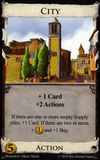 |
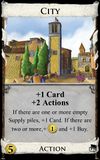 |
+1 Card +2 Actions If there are one or more empty Supply piles, +1 Card. If there are two or more, + and +1 Buy. |
Prosperity | October 2010 |
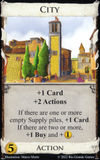 |
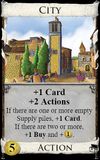 |
+1 Card +2 Actions If there are one or more empty Supply piles, +1 Card. If there are two or more, +1 Buy and +. |
Prosperity (2016 printing) Prosperity (Second Edition) |
February 2017 |
Other language versions
Trivia
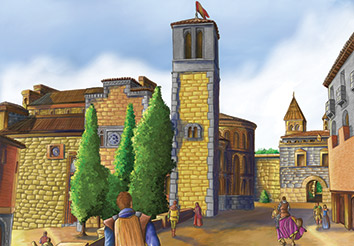
This was originally called Boomtown, but it was decided that word didn't fit the medieval theme of Dominion, and it was changed.
Card Art
Secret History
